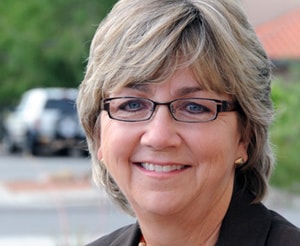
Lt. Gov. Diane Denish (Photo by Heath Haussamen)
Lt. Gov. Diane Denish has released 60 pages of documents related to her schedule for a 30-day period.
The release of documents comes after Denish’s office responded to a request for a copy of her schedule for that 30-day period by saying it doesn’t maintain a schedule or calendar for Denish. The office also refused to say who – if anyone – does keep such a document.
You can get a good sense of the public events in which Denish took part from the documents her office released, which you can view by clicking here. Most are invitations to public events that have a “Yes” or “No” handwritten on them to indicate whether Denish attended the event.
For example, Denish accepted an invitation to speak at the New Mexico Rural Water Association’s annual conference in early April in Albuquerque. But she did not attend a March 29 meeting of the New Mexico Chapter of the Commercial Real Estate Development Association at which Albuquerque Mayor Richard Berry presented his economic development plan for the city.
But the documents Denish’s office released tell us nothing about time Denish spent in her official capacity meeting with constituents or doing things other than appearing at public events.
As was the case when the Third Judicial District Attorney’s Office in Las Cruces announced that it is not maintaining a calendar or schedule for District Attorney Susana Martinez, the question is whether Denish or someone else outside her government office is maintaining a calendar of her appointments or whether no one is keeping a schedule of her work-related appointments.
Denish and Martinez are both running for governor and have campaign staffs. Neither is saying who, if anyone, maintains calendars related to their public jobs.
As I’ve already reported, the Attorney General’s Office and the head of the New Mexico Foundation for Open Government (FOG) disagree about whether, should such hypothetical calendars or schedules exist somewhere other than in public officials’ government offices, they are public records.
Phil Sisneros, the AG’s spokesman, says the AG believes “personal calendars and schedules are more like notes a public employee keeps for his or her own use, even if they include business appointments,” and are not public records.
But Sarah Welsh, FOG’s executive director, says the public records act “applies to all documents regardless of physical form or characteristics that are used, created, etc. by any public body and relate to public business.” She says if public officials are keeping personal calendars and those are the primary way they keep track of appointments related to their public jobs, “that’s clearly a public record.”